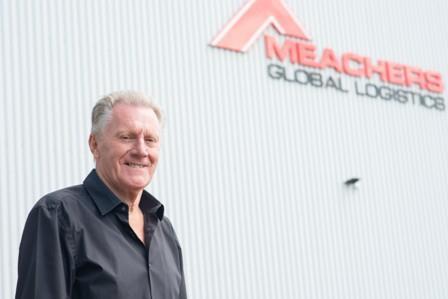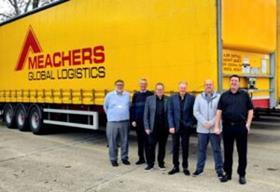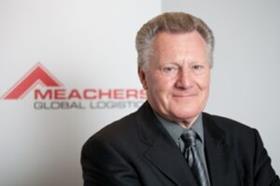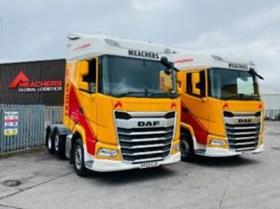
While attention this year has understandably been focused on the Queen’s Platinum Jubilee, a VIP of the transport industry is celebrating a Diamond Jubilee after recently passing the milestone of 60 years with his firm.
Bob Terris, chairman of Meachers Global Logistics, joined the Meachers family coal merchant and transport company on 1 April 1962, aged 17.
Starting from a small hut in a gravel yard in Westfield Road in Totton near Southampton, the company now has a turnover of over £56m, operates 500,000sq ft. of warehousing and runs a fleet of 80 trucks. Sixty years on, Terris has lost none of his enthusiasm and passion for the transport and logistics industry or the company he and his family now own.
Terris was born in Bristol, but moved to Southampton in 1962 and joined former coal merchant Fred Meacher and his three sons at Meachers Transport, which had been formed in 1958, in the role of traffic controller, the first employee outside the Meachers family. Terris was soon promoted to transport manager, general manager and became a director in 1976.
Pirelli chapter
In 1985, Meachers Transport came under the ownership of Pirelli Cables, which is an interesting chapter in the company’s history, as Terris recalls.
“We quickly sold the coal business and in 1965 we bought a small transport business called Itchen Transport with a 2-acre site in West Quay Road in Southampton,” he says. “In 1968, Itchen Transport was being run by one of the Meacher brothers and the much bigger Meachers Transport operation was based in Totton. We sold Totton and moved everything into West Quay Road and I ended up running both companies.
“In 1979, Pirelli General won a contract with the Central Electricity Generating Board to produce 50km lengths of undersea cable to link the British and French national grids. They wanted to construct a new submarine cable factory with a huge drum to hold this cable, but the only way they could get the cable onto the cable-laying ships that moored behind our yard was over our premises.
“When we bought Itchen Transport it had a 99-year lease on this 2-acre site backing onto the dock, so that site was worth a fortune. By that time the only Meacher brother left was Ray and I was running the whole operation. We got an offer from Pirelli but I said we can’t accept as if they put a gantry over this site all the value will be gone.
“So they came back and offered us land they had over in Eastleigh in return for West Quay Road. But again we said no as we were doing a lot of work out of the docks and having a remote site would have cost us a lot more.”
Pirelli’s next offer was to buy the company and the lease.
“We accepted and that is how we ended up being owned by Pirelli,” says Terris. “They gave us an admin office in their place over the road and I ran the company out of our operating site. Pirelli’s MD became our chairman and he had lots of ideas on how to change things.
“To be fair to them, they owned this business for 15 years, we agreed on a budget every year and they never interfered.”
Relocation
During this period, Terris relocated the business to its current home in Nursling, on the northern edge of Southampton, vacating West Quay Road which is now a shopping centre.
In 1991, he tried to persuade Pirelli to part with the company as the global business restructured and began to sell off non-core activities. At first Pirelli were reluctant to sell as they had never had a management buyout in their 200 year history.
“I said ‘there has to be a first time’ but they wanted me to find a venture capitalist buyer. So I spoke to Hill Samuel and they prepared a tender document and I put in an offer.
“Next morning, the chairman called me over and asked me ‘what’s that?’ so I said ‘it’s an offer’. He said ‘that’s nowhere near enough’ to which I replied ‘how many other offers do you have?’ The answer was ‘none’! They had been told the business was worth far more based on goodwill but I was the goodwill.
After a few months leaving Pirelli to consider their limited options, Terris went back with a revised offer.
“We were on a bonus scheme, so I said ‘instead of the money, give us shares’. It was a five-year deal and I said ‘if at the end of that we can’t agree on a price, you buy our shares back and we walk’. Five years later I bought it for the same price I offered earlier, but they had all the profits for those five years.”
Pirelli then asked Terris to handle its UK distribution, which required some thought, and he set up an operation at its cable factory in Aberdare in South Wales.
“But I didn’t want to have that much of our business with one client,” says Terris. “So I put it out to tender – and we lost it.”
Ideally placed
Ironically, Meachers now does work for Prysmian, the Italian owners of Pirelli Group, as well as a host of manufacturers and importers in a wide variety of industry sectors. Being close to Southampton docks also means it is ideally placed to service the huge Carnival cruise ships that dock there, a business that fell away in the pandemic but is now recovering strongly.
Under Terris’s stewardship, the Meachers business has grown and expanded its service offering to include freight forwarding and 500,000sq ft of storage on seven sites around Southampton and a transport depot near Derby. In 2009, the company rebranded as Meachers Global Logistics to reflect these wider range of services. The transport fleet of 80 vehicles still brings around 50% of revenue however.
“We have four sites at Nursling and warehouses on the docks at Marchwood [on the west side of Solent Water] and Fair Oak [near Eastleigh].” says Terris. “Some of it is high rise, some low rise and some open. We are just taking on another 4-acre open storage site because a customer is importing stone from India. We ship it in and store it outside before doing the distribution.”

Working first for a family owner and then a PLC was a salutary lesson for Terris, who now has two of his sons working with him – MD Stuart and Fleet Director Jamie. There are also three external Directors: Noel Fensome (finance), Gary Whittle (commercial) and Rob Lewis (international operations).
Terris became Chairman in 2011 when Stuart stepped up from operations director to MD.
He says: “My sons and all my board directors have been with Meachers for more than 20 years and we’ve all grown together. We get on well, enjoy work and all pull in the same direction – which is critical.
“To run a family business which isn’t yours is difficult because everyone wants something out of it and the people making the money don’t get it. That’s not the case here now. Working for a PLC, the bureaucracy can be a challenge. I’ve kept the best parts of a PLC, which are the governance and control procedures, but did away with the bureaucracy.
“My sons are shareholders but they get paid for the job they do. The three non-shareholders get the money for the job and a share of the profits, but no family member gets a gallon of petrol or anything else out of the business. Nothing.”
Sole shareholder
Terris bought the business from Pirelli with a mix of debt and equity funding, with RBS owning 35% of the shares. The debt was quickly repaid from earnings but RBS then wanted Terris to sell the business to a venture capitalist to give them an exit.
“I said ‘I didn’t buy it to sell it – if you want out sell me the shares’,” he says. “So we negotiated a price so we had 100% of the shares. I don’t want external shareholders – I have given some shares to my sons but the company remains in sole family ownership.
“We own some of our properties but not the warehouses which are all leased. As we kept adding buildings we ended up with different run-out dates. I’ve now got them all on similar dates so if we lose a contract or the mix is wrong I can rejig the business. We have different types of activity in different locations so we have less congestion because there are different entrances to the buildings even though they are on the same site.”
Terris adds: “We’ve had tough times, been through several recessions, national dock and lorry drivers’ strikes, complex global supply chains and the challenges of Brexit and Covid more recently.

“I was born the day before D-Day so while I don’t remember the War we have seen a lot of changes over the years. If you think of the conditions drivers used to work under - the long hours, the pay and the type of vehicles they had to drive – and all the strikes we had, it was a mess really.
“Then you look at all the employment legislation from Europe, which we aren’t going to get rid of, the unions are facing challenging times. Employed people have so much protection they don’t really need a union now. We employ 200 people and only one is in a union. So there have been huge improvements in the standards in our industry.”
Terris recounts a conversation with good friend Des Evans, former MAN CEO, who asked him how many modern Euro-6 44-tonne trucks would produce the same emissions as one 1962 28-ton truck. “The answer was 140,” says Terris. “We should use Des’s line that ‘we don’t run trucks, we run air fresheners!’.
“We don’t promote our industry enough - every time we get an opportunity to speak at schools or universities we tell people how important we are. There will always be jobs in this industry because you can’t sell anything unless you move it. So there will always be a transport industry, though what it will look like and how many people will be involved in it is open to discussion.”
Brexit delays
Covid replaced Brexit in the headlines but longer term as an international freight forwarder as well as a UK transport and warehousing business Meachers is still seeing the effects of the UK’s exit from the EU single market.
“Brexit has been hidden by the pandemic but there have been major consequences for our shipping side,” says Terris. “The extra paperwork on clearances means there is a huge cost which everyone has forgotten since the pandemic and Ukraine have taken people’s attention.”
The pandemic however, provided opportunities for Meachers and in the year to the end of May 2022 it saw record sales and profits. Turnover was £56m, up from £36.5m in 2020/21, and while pre-tax profits had not been finalised at the time of MT’s interview it is likely they will be well up on the previous year’s £3.3m.
“The interesting thing about this year was the mix of revenue because our shipping side saw a big increase,” says Terris. “We had a customer that got involved in Covid testing so we had a huge amount of business in air freight with them. We also warehouse and distribute the product for them which replaced the drop in our cruise-related business with Carnival.
“But our cost base has risen enormously, with an 18% increase in wages and the price of trucks has also gone up. While the volumes are there and there is an understanding that there is inflation, you can sometimes pass those extra costs onto customers. But when you get higher inflation you also get erosion of the margin if you only review your costs once a year.
“We review ours every six months with existing customers but with new customers costs are changing all the time. The concern has to be that if inflation continues and disposable income drops, the economy will reduce and then you are left with less volume, which puts pressure on prices, and a high fixed cost base.
“The worst scenario is that we go into recession, volumes drop and supply exceeds demand. I do believe there will be a recession this year because with inflation at 10% people just don’t have the money to spend. What might offset that is that I think there will be fewer hauliers and trucks. Second-hand values of older trucks are good now but not on Euro-6s because you can’t export them as they are too high tech.
“People are getting unbelievable amounts of money for anything older than Euro-6 but when those trucks run out they haven’t got the money to buy new ones so they go out of business or reduce their fleets.”
The investment gap will only grow as diesel trucks are phased out in favour of zero emissions electric vehicles, which are around three times more expensive and less productive due to their limited range.
Five-year life
Meachers’ usual policy when it comes to trucks is buy outright with a five-year contract maintenance package and then move them on.
“That reduces the downtime but we have had to invest a lot of money to get to this position,” says Terris. “Our problem now is availability – we have 15 trucks and 25 trailers on order but the likelihood is none will turn up on time. So if we have a truck on contract maintenance that is coming up to five years old and the new one doesn’t arrive on time we are at risk of any breakdowns.
“We have 10 Mercedes on order and I argue that if they are replacing existing Mercedes trucks, and they don’t deliver, they should underwrite the risk and extend our contract maintenance at the same rate. That would encourage you to buy the same vehicles again.”
As well as delays in getting new trucks delivered Terris says the rental market has almost disappeared with the impending exit of Ryder from the UK.
“You cannot get a spot hire vehicle now,” he says. “You used to be able to hire for a week or even a day – now it’s six months minimum and most are 12 months. We have two peaks and use regular subcontractors where we manage their vehicles so it is just like adding on to our fleet. Then we had spot hire vehicles and agency drivers to cover the peaks. Why would you hire a vehicle for a year if you only have three months’ work for it?
“There will be huge shortages in the Christmas and Easter peaks.”
Terris also worries about the future of the subcontractor base as costs relentlessly increase. “A lot of smaller operators won’t survive,” he predicts. “We use subcontractors with two or three trucks and they will be OK with us but if you take the large 3PLs where a huge proportion of the contract work they do is subcontracted, if those subbies don’t survive they will have to put more trucks on the road.
“But they can’t do the work for the same price as the subcontractors. There isn’t enough in the contracts so if they don’t sub out some of it the margins will go down.”
What driver shortage?
While Meachers is experiencing a truck shortage, its increases in wages have more or less solved its driver shortage.
“We have 100 drivers and only currently have one vacancy,” says Terris. “We gave them an increase in June and another in November last year. In July they got a £500 loyalty bonus and in June 2022 they got another increase.
“The only way we can pay those higher costs is to be ultra-efficient and highly profitable. We have the warehousing and shipping where the margins are bigger than transport and we are highly efficient. We don’t do much empty running, we double shift and we squeeze the pips.”
While Meachers does use agency drivers, they first have to go through the company induction process and be registered. This policy had to be loosened in the pandemic when volumes shot up, with a resulting decrease in productivity and increase in vehicle damage.
“We are better off paying our drivers more and having a full quota than paying less for agency drivers,” says Terris. “Agency drivers benefit from being able to pick and choose when they work which they can’t do here.”
“The days of saying ‘this is the job, take it or leave it’ have gone. We have five-day shifts, night shifts, four-on, four-off and some older drivers only want to work four days a week. We try to accommodate their circumstances within our requirements.”
Double shift
Only around a dozen drivers now routinely night-out in the trucks as this means the vehicle can’t be double-shifted which is the aim for the 50 tractor units at least. “We are getting on average 19 hours of work a day from those trucks,” says Terris. “That is the only way to spread the high fixed costs and make money.”
At 77, Terris is still in the office every day and immersed in the business. When he does take time to relax, Terris enjoys playing golf and watching sport, especially football and cricket - he’s honorary vice president of Hampshire Cricket. He enjoys gardening at his home in Hampshire and spending time with his wife Josie and their family. He says: “It’s 60 not out for me! The plan is to carry on as long as I feel I’m making a contribution - I love it.”
The future for pallet networks
Meachers covers most of the SO postcodes for Palletways and Terris is a great believer in pallet networks – though he worries about their future.
“All networks are losing good quality companies and bringing in lower quality companies,” he says. “So the overall quality of hauliers in the networks is not good. When you are selling a collective service you are only as good as the weakest link.
“We were in Pall-Ex when Hilary [Devey, the late founder of Pall-Ex] owned it and it worked for us as we were running 18-tonners all over the country doing multi-drops. It was very beneficial to us at first but over 10 years it ceased to be of any benefit because we are in a consumption not a manufacturing area, so we were taking more out and you lose money on the deliveries and make money on what you put in.”
But after a spell outside the pallet networks an acquisition in 2021 saw the company join Palletways.
“We got into Palletways when we bought AFS [Haulage based in Fair Oak] and it is working OK for us. When we weren’t in a network we were a customer because if we do all of one of our customer’s distributions we would pay to put some of their pallets into Pall-Ex,” says Terris. “AFS had a shortfall on their input but we had all the pallets we were putting into another network to plug the gap. If you can get the balance right and you don’t have any area too far from the depot it is OK. Those members covering postcodes 25 or 30 miles from their depots must be frustrated.
“When an operator goes bust, the network puts pressure on the next member to take over and what might be decent business is all of a sudden not such decent business.”
Like many people with long experience Terris says the principles behind running a successful transport business are simple – it is just the execution that is hard.
“You need three things to be successful in our industry – volume, mix and price,” he says. “You can have as much volume as you like but if it doesn’t fit properly or you don’t get the right price you will never make any money.
“That is where these big conglomerates are facing their biggest challenge – they are going after volume without looking at the other two. Every week our operations guys have a meeting with the sales guys and they say ‘we’ve got a gap, we need work out of there’. Ideally if we have work going there and we can’t get anything back, we don’t send our trucks, we subcontract it to reduce the empty running.
“Too many people do not pay attention to the detail – they think if the wheels are running they are making money but that is not always the case.”
New Generation DAFs join Meachers fleet
Meachers has recently expanded its fleet as part of a £1.5m investment programme. It has put in five New Generation DAF XG tractor units at its Nursling headquarters and a further two DAF CF 26T rigids with tail lifts at its Palletways base in Fair Oak.

All the new vehicles will be fitted with the latest camera technology in line with the London Direct Vision Standard, partly because any Meachers vehicle could find itself in London and partly to protect residual values.
“We take a long-term view and always buy the best spec so we can use the truck for anything,” says Terris. “When Euro-6 came out we bought them straight away because we want the most modern equipment. The DAFs are good trucks – we had some old model DAF rental trucks and they performed very well.”
“We buy three makes – Volvo, Mercedes and DAF – all good trucks, all reliable and all the dealers are round the corner. We run Mercedes primarily in Derby because the dealer is just down the road, and here [in Nursling] they are all on this estate.”
Meachers buys all of its trucks with contract maintenance packages that includes night or weekend R&M to minimise downtime but still maintains its trailers in-house.
Terris is sceptical about the 2035 and 2040 deadlines to phase out sales of new non-zero emissions trucks.
“I don’t think it will be financially possible to introduce all these things in the timeframe they have in mind,” he says. “It will crucify the world economy. There will still be plenty of older trucks running around and I reckon we will make a decent return on our five-year old vehicles when the new ones come in.”













